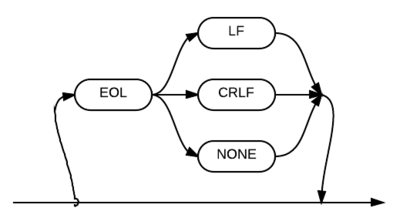EOL: Difference between revisions
Jump to navigation
Jump to search
No edit summary |
No edit summary |
||
| Line 6: | Line 6: | ||
# EOL=CRLF for DOS systems;<br> | # EOL=CRLF for DOS systems;<br> | ||
# EOL=LF for Unix / Linux systems. | # EOL=LF for Unix / Linux systems. | ||
Used in: | |||
*[[Open Communications]] statements | |||
<noinclude> | <noinclude> | ||
[[Category:All Parameters]] | [[Category:All Parameters]] | ||
</noinclude> | </noinclude> | ||
Revision as of 15:36, 6 August 2013
The "EOL=spec" parameter indicates the end-of-line separator for the data file being opened. The EOL keyword and equal (=) symbol are required. The "spec" keyword must be replaced with one of three options: LF (line feed), CRLF (carriage return, line feed and Ctrl-Z for end of file marker), or NONE. If either CRLF or LF is specified, then both are accepted as valid record delimiters for input; they are removed from incoming data. The syntax for this parameter can be inserted into any diagram that calls for the EOL=spec parameter.
Defaults
- EOL=CRLF for DOS systems;
- EOL=LF for Unix / Linux systems.
Used in:
- Open Communications statements
